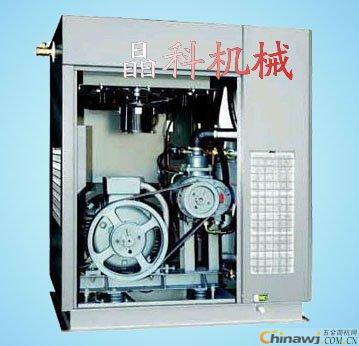Several issues arise during the maintenance and repair of air compressors when they are shut down. Proper shutdown procedures are essential to ensure the equipment remains in good condition and operates safely.
First, gradually close the unloading valve to allow the compressor to run without load. This helps reduce stress on the system and ensures a smooth transition to shutdown.
Next, disconnect the power supply so that the motor stops running. For diesel-powered compressors, the engine should be turned off and allowed to cool down properly.
After each use, the pressure in the air tank will decrease slightly. It is important to open the drain valve at the bottom of the cylinder to release any accumulated oil and water. Machines that operate continuously should have this done every 8 hours to maintain clean compressed air.
In case of emergencies, the compressor should be stopped immediately under the following conditions:
(1) If the diesel engine’s oil pressure or water temperature is outside the acceptable range, or if there is unusual noise from the machine, stop it for inspection.
(2) If there are abnormal sounds coming from the crankcase, cylinder, or valve chamber, stop the unit immediately.
(3) If the automatic pressure control system or safety valve fails, causing the tank pressure to exceed the rated limit, take immediate action.
(4) If the exhaust or lubricating oil temperature goes beyond safe limits, stop the compressor to prevent damage.
(5) If the motor experiences excessive temperature rise or current draw, or if sparks appear in the electrical circuit, stop the unit immediately.
Once the compressor is shut down, perform necessary maintenance tasks such as cleaning and tightening moving parts to ensure continued reliability.
It is important to avoid using gasoline or kerosene to clean the air filter, cylinders, or other parts of the compressed air system. These substances can pose fire and explosion risks. Never use combustion methods to remove oil from the pipeline.
When using diesel or gasoline for cleaning, smoking must be strictly prohibited. Keep all flammable materials away from the area. Used waste oil, rags, and cotton should be disposed of properly and not discarded carelessly.
The air filter should be cleaned regularly to maintain airflow efficiency and reduce energy consumption. A clogged filter increases workload and may lead to higher energy costs.
If the air compressor is used for sandblasting or rust removal, keep it at a safe distance from the work area and implement proper dust control measures to protect both the equipment and the environment.
First, gradually close the unloading valve to allow the compressor to run without load. This helps reduce stress on the system and ensures a smooth transition to shutdown.
Next, disconnect the power supply so that the motor stops running. For diesel-powered compressors, the engine should be turned off and allowed to cool down properly.
After each use, the pressure in the air tank will decrease slightly. It is important to open the drain valve at the bottom of the cylinder to release any accumulated oil and water. Machines that operate continuously should have this done every 8 hours to maintain clean compressed air.
In case of emergencies, the compressor should be stopped immediately under the following conditions:
(1) If the diesel engine’s oil pressure or water temperature is outside the acceptable range, or if there is unusual noise from the machine, stop it for inspection.
(2) If there are abnormal sounds coming from the crankcase, cylinder, or valve chamber, stop the unit immediately.
(3) If the automatic pressure control system or safety valve fails, causing the tank pressure to exceed the rated limit, take immediate action.
(4) If the exhaust or lubricating oil temperature goes beyond safe limits, stop the compressor to prevent damage.
(5) If the motor experiences excessive temperature rise or current draw, or if sparks appear in the electrical circuit, stop the unit immediately.
Once the compressor is shut down, perform necessary maintenance tasks such as cleaning and tightening moving parts to ensure continued reliability.
It is important to avoid using gasoline or kerosene to clean the air filter, cylinders, or other parts of the compressed air system. These substances can pose fire and explosion risks. Never use combustion methods to remove oil from the pipeline.
When using diesel or gasoline for cleaning, smoking must be strictly prohibited. Keep all flammable materials away from the area. Used waste oil, rags, and cotton should be disposed of properly and not discarded carelessly.
The air filter should be cleaned regularly to maintain airflow efficiency and reduce energy consumption. A clogged filter increases workload and may lead to higher energy costs.
If the air compressor is used for sandblasting or rust removal, keep it at a safe distance from the work area and implement proper dust control measures to protect both the equipment and the environment.

Actuator make a valve enter into a new era of application, Valve Actuator, Evolved Torque Works For Flow Control Automation! Supply Series of Actuators such as Electric Actuator, Linear Valve Actuator, Rotary Valve Actuator,Motorized Valve Actuator, etc. are for Flow Control Automation
Electric Actuator, Linear Valve Actuator, Rotary Valve Actuator,Motorized Valve Actuator, Flow Control Automation
Zhejiang Philic Fluid Control Co.,LTD , https://www.philicflow.com